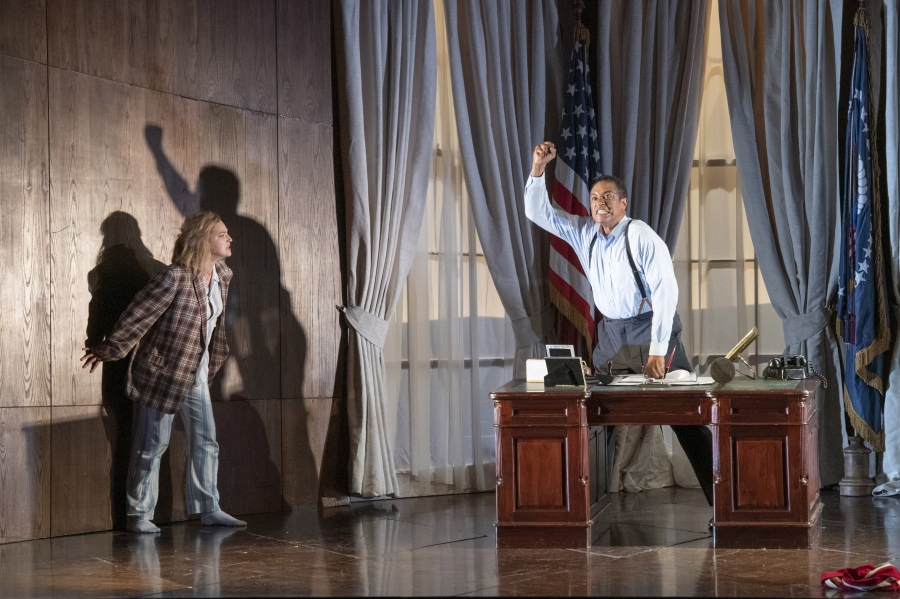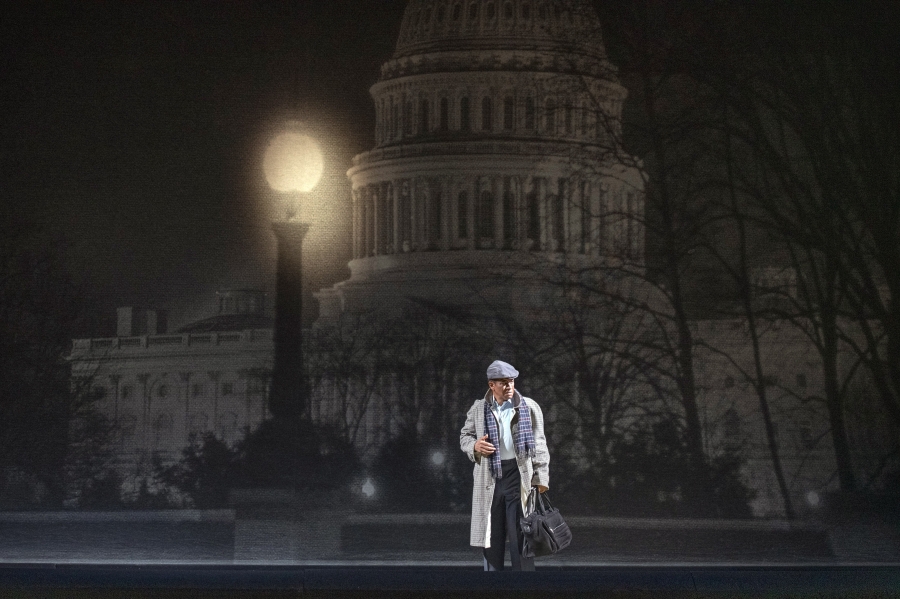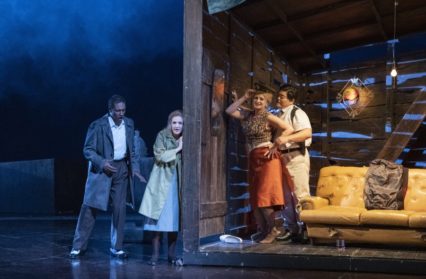Cath Barton revisits a Kennedy era White House as she casts a critical eye over Welsh National Opera’s timely revival of their acclaimed production, Verdi’s Rigoletto.
In Aidan Lang’s first season for WNO as General Director, we have a series of crowd-pleasers: Bizet’s Carmen, Janáček’s The Cunning Little Vixen and this revival of the company’s 2002 production of Guiseppe Verdi’s Rigoletto.
Rigoletto is full of glorious melody – Verdi reputedly forbade the singing of the Duke’s aria ‘La donna è mobile’ outside the rehearsal room before the opera’s first performance in 1851, so as not to jeopardise its success. In the history of opera it is important as marking the start of a period of operatic composition in which conventions became less rigid, form and drama more expansive. Together with the two operas which he wrote in the following two years – Il trovatore and La traviata – it sealed Verdi’s international reputation and marked the passage towards the verismo operas which would be developed by Puccini and others later in the nineteenth century.
The libretto is by Francesco Maria Piave after Victor Hugo’s play Le Roi s’amuse (1832). The play was banned by the censors after a single performance, but Verdi overcame potential objections to its implied criticism of corruption in high places by setting it in Renaissance Mantua rather than mid- nineteenth-century France. The setting for James Macdonald’s production for WNO is a (fictitious) 1960s White House. Any parallels with the behaviour and implied motives of today’s politicians are, of course, in the minds of the audience.

Photocredit: Richard Hubert Smith
Korean tenor David Junghoon Kim as the Duke has a suitably arrogant swagger and all the high notes and vocal power which the role demands and audiences love. When the beautiful drop depicting the buildings on Capital Hill in a misty evening light is raised at the end of the overture, two women who have been attending to the Duke are hurried out as a party goes on in the next room. The scene is set effectively for the drama of accusation, curse, seduction and final tragedy which is to unfold.
Although the opera bears the name of Rigoletto, the Duke’s jester, he is no conventional hero, and the more interesting for the complexity of his character. American bass-baritone Mark S Doss embraces the different facets of the role in an assured way, singing a touching duet with his daughter Gilda in Act Two, while showing his scheming side elsewhere.
If Verdi gives his best tunes to the men, it is the women who, for me, excel amongst the singers in this production. Spanish soprano Marina Monzó brings a beautiful lyricism to the role of the tragic heroine, Gilda, while British mezzo Emma Carrington is superbly seductive in the role of Maddalena, the woman who persuades her brother Sparafucile (the hired killer) to spare the Duke. It is the Act Three quartet ‘Bella figlia dell’amore’, sung by the Duke, Gilda, Rigoletto and Maddalena, that is the musical climax of the opera. It was, for me, the highlight of the evening, sung and staged superbly. It is example, par excellence, of how opera enables different emotions to be conveyed simultaneously in a dramatic and clear way.

Photocredit: Richard Hubert Smith
Amongst the other singers, British bass James Platt is convincingly menacing as Sparafucile and members of the WNO chorus step out proficiently in minor roles. The men’s chorus as a whole convinces as a bunch of henchmen to the duke, and provide off-stage sounds of the storm in Act Three. The women of the chorus draw the short straw in Rigoletto, being required only to look decorative and/or seductive.
All the action of the opera is written in Verdi’s music and a production needs to enable rather than over-emphasise it. Sometimes the direction and the set seemed a little over-fussy, although in Act Three the design by Robert Innes Hopkins worked really well in supporting the drama of the afore-mentioned quartet. The orchestration is full of colour and – when required – fury, and the ever-excellent WNO orchestra is really the star of this production in conveying all of that, conducted with precision by Alexander Joel.
You might also like…
Janáček’s The Cunning Little Vixen – Nigel Jarrett welcomes the revival of a landmark production by Welsh National Opera of an enchanting Czech masterpiece.
Cath Barton won the New Welsh Writing AmeriCymru Prize for the Novella with The Plankton Collector, which is published by New Welsh Review under their Rarebyte imprint. Her second novella, In the Sweep of the Bay, will be published by Louise Walters Books in September 2020, and in early 2021 Retreat West Books will publish her collection of short stories inspired by the work of the Flemish artist Hieronymus Bosch.



 Enjoyed this article? Support our writers directly by buying them a coffee and clicking this link.
Enjoyed this article? Support our writers directly by buying them a coffee and clicking this link.







